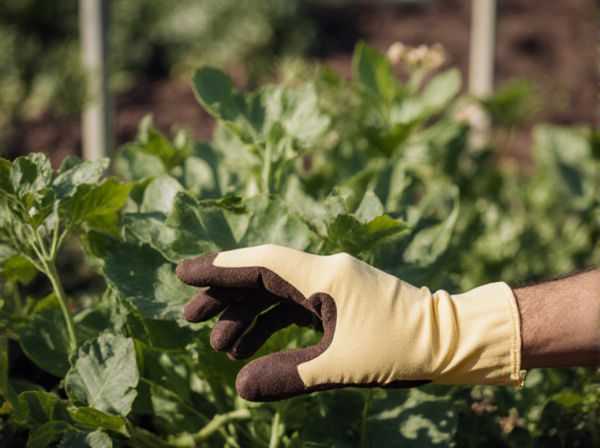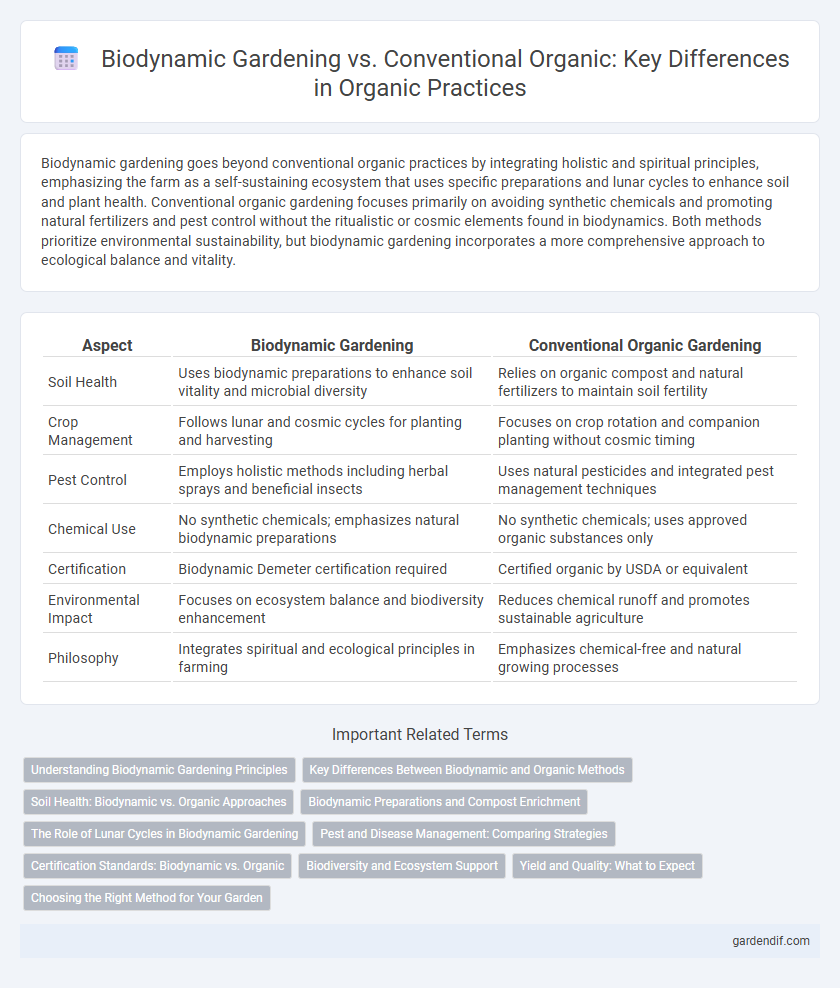
Biodynamic gardening vs conventional organic Illustration
Biodynamic gardening goes beyond conventional organic practices by integrating holistic and spiritual principles, emphasizing the farm as a self-sustaining ecosystem that uses specific preparations and lunar cycles to enhance soil and plant health. Conventional organic gardening focuses primarily on avoiding synthetic chemicals and promoting natural fertilizers and pest control without the ritualistic or cosmic elements found in biodynamics. Both methods prioritize environmental sustainability, but biodynamic gardening incorporates a more comprehensive approach to ecological balance and vitality.
Table of Comparison
| Aspect | Biodynamic Gardening | Conventional Organic Gardening |
|---|---|---|
| Soil Health | Uses biodynamic preparations to enhance soil vitality and microbial diversity | Relies on organic compost and natural fertilizers to maintain soil fertility |
| Crop Management | Follows lunar and cosmic cycles for planting and harvesting | Focuses on crop rotation and companion planting without cosmic timing |
| Pest Control | Employs holistic methods including herbal sprays and beneficial insects | Uses natural pesticides and integrated pest management techniques |
| Chemical Use | No synthetic chemicals; emphasizes natural biodynamic preparations | No synthetic chemicals; uses approved organic substances only |
| Certification | Biodynamic Demeter certification required | Certified organic by USDA or equivalent |
| Environmental Impact | Focuses on ecosystem balance and biodiversity enhancement | Reduces chemical runoff and promotes sustainable agriculture |
| Philosophy | Integrates spiritual and ecological principles in farming | Emphasizes chemical-free and natural growing processes |
Understanding Biodynamic Gardening Principles
Biodynamic gardening involves holistic practices that treat the garden as a self-sustaining ecosystem, integrating cosmic rhythms, lunar cycles, and biodynamic preparations to enhance soil fertility and plant health. Unlike conventional organic methods that emphasize chemical-free inputs, biodynamic principles focus on spiritual and ecological harmony, fostering biodiversity and natural nutrient cycles. This approach promotes vigorous plant growth and resilience by aligning gardening activities with natural forces and cosmic influences.
Key Differences Between Biodynamic and Organic Methods
Biodynamic gardening incorporates holistic, spiritual, and cosmic principles, using preparations like compost teas and lunar calendar planting schedules, distinguishing it from conventional organic methods that primarily focus on avoiding synthetic chemicals and promoting soil health through natural fertilizers. Biodynamic practices emphasize farm self-sufficiency and ecosystem integration by treating the farm as a living organism, while organic gardening relies on established organic standards and certification guidelines. Key differences include the use of specific biodynamic preparations, timing based on astrological events, and a more ritualistic approach to soil and plant health compared to conventional organic farming.
Soil Health: Biodynamic vs. Organic Approaches
Biodynamic gardening emphasizes holistic soil health through the use of prepared herbal composts and lunar planting cycles, enhancing microbial diversity and nutrient availability beyond conventional organic methods. Conventional organic practices prioritize natural inputs and chemical-free amendments but may not integrate the cosmic rhythms and specific biodynamic preparations that stimulate soil vitality. This results in biodynamic soil management fostering more resilient ecosystems and improved long-term soil structure compared to standard organic approaches.
Biodynamic Preparations and Compost Enrichment
Biodynamic gardening incorporates unique preparations such as horn manure (Preparation 500) and silica (Preparation 501) to enhance soil vitality and stimulate microbial activity, which contrasts with conventional organic methods that primarily rely on natural compost and organic fertilizers. Compost enrichment in biodynamics involves the integration of these preparations into compost piles, accelerating decomposition and enriching nutrient density more effectively than standard organic composting techniques. This holistic approach not only improves soil structure but also promotes plant health by fostering a dynamic ecosystem aligned with lunar and cosmic rhythms.
The Role of Lunar Cycles in Biodynamic Gardening
Biodynamic gardening incorporates lunar cycles to optimize planting, cultivating, and harvesting, aligning activities with the moon's phases to enhance soil vitality and plant growth. This approach contrasts with conventional organic methods, which primarily emphasize natural inputs and chemical avoidance without lunar timing considerations. Research indicates that aligning gardening practices with lunar rhythms can improve nutrient uptake and overall plant resilience in biodynamic systems.
Pest and Disease Management: Comparing Strategies
Biodynamic gardening employs holistic, spiritually-informed practices such as herbal preparations and lunar calendars to enhance plant resilience against pests and diseases, emphasizing soil vitality and ecosystem balance. Conventional organic methods rely on natural pesticides, crop rotation, and beneficial insects to control infestations while avoiding synthetic chemicals. Both strategies prioritize sustainable pest management but differ in their integration of metaphysical principles and timing rooted in biodynamic philosophy versus purely empirical organic approaches.
Certification Standards: Biodynamic vs. Organic
Biodynamic gardening certification involves strict adherence to Demeter standards, emphasizing holistic farm management, lunar planting cycles, and use of specific preparations to enhance soil and plant health. Conventional organic certification follows USDA or equivalent standards, focusing primarily on prohibiting synthetic chemicals and promoting natural inputs without the ritualistic or cosmic considerations found in biodynamics. These differing certification frameworks reflect a core divergence in philosophy, with biodynamic certification requiring a spiritual and ecological integration that surpasses conventional organic mandates.
Biodiversity and Ecosystem Support
Biodynamic gardening enhances biodiversity by integrating diverse plant species and animals into a self-sustaining ecosystem, promoting natural pest control and soil fertility. This method supports ecosystem health more robustly than conventional organic practices through its holistic approach, including the use of compost preparations and lunar planting cycles. Conventional organic farming focuses primarily on avoiding synthetic inputs but often lacks the intricate ecological integration central to biodynamics.
Yield and Quality: What to Expect
Biodynamic gardening often produces lower yields compared to conventional organic methods due to its strict adherence to lunar cycles and holistic soil management, but the quality of produce is significantly enhanced with richer nutrient profiles and improved flavor complexity. Conventional organic farming tends to prioritize maximizing yield within organic standards, which can result in larger quantities but sometimes less concentrated nutritional value. Choosing biodynamic methods emphasizes plant vitality and ecosystem health, leading to superior quality crops despite potentially smaller harvests.
Choosing the Right Method for Your Garden
Biodynamic gardening enhances soil health through holistic practices like composting with herbal preparations and lunar planting rhythms, creating a self-sustaining ecosystem. Conventional organic methods emphasize using natural fertilizers and pest control without synthetic chemicals, prioritizing soil enrichment and biodiversity. Selecting the right approach depends on your garden's scale, local climate, and personal commitment to ecological principles and long-term soil vitality.
Biodynamic gardening vs conventional organic Infographic

 gardendif.com
gardendif.com